Success stories can be rare in Pakistan, but business is booming in one Kashmir tourist spot as the region rebuilds after a devastating earthquake and shrugs off associations with violence.
Hundreds of thousands of Pakistani tourists drawn to the lakes and glaciers of the Neelum valley are injecting desperately needed money into one of the poorest parts of the country.
Westerners stopped coming to the Himalayas of Pakistani-Kashmir years ago, put off by its reputation as a training ground for Islamist militant groups and the risk of sporadic conflict with India.
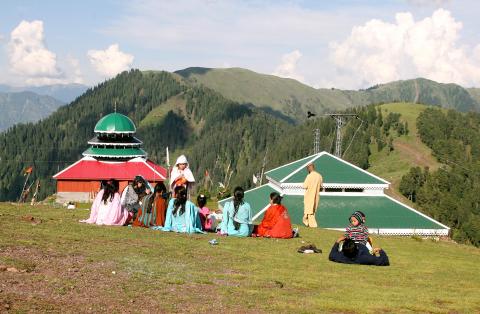
Photo: AFP
But with a new road built by the Chinese after the 2005 earthquake killed 73,000 people and a ceasefire holding with India, Pakistanis are discovering the snow-capped peaks, glaciers, lakes and lush-green meadows of the Neelum valley.
Known locally as “Paradise on Earth,” the valley is 114km east of the base camp where gunmen shot dead American, Chinese, Lithuanian, Slovakian and Ukrainian climbers in June.
It was the worst attack on foreigners in Pakistan for a decade, but in neighboring Kashmir, few Pakistanis are worried.
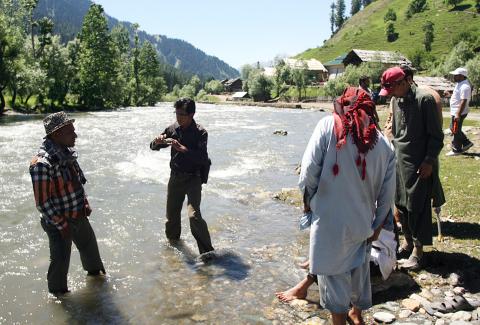
Photo: AFP
“There is a bit of fear there, but overall we are enjoying ourselves and we will stay according to our plan,” said Mohammad Amir, a lawyer on holiday with his family from southern Punjab.
Munazza Tariq, a university student from Karachi, agrees.
“This was carried out by enemies of Pakistan. After it happened, we received a lot of calls from our relatives from Karachi, but we are safe and enjoying ourselves,” said Munazza.
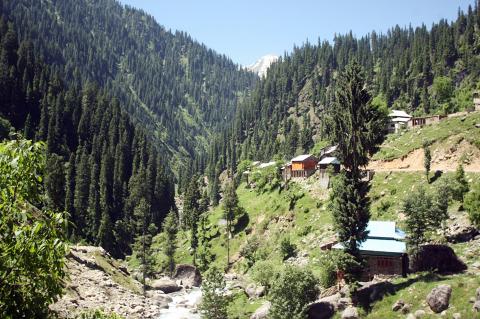
Photo: AFP
Local tourism ministry official Shehla Waqar says 600,000 people visited Neelum last year compared to 130,000 in 2010, before the Chinese built a road linking the area to Muzaffarabad, the capital of Pakistani-administered Kashmir.
“There is an influx of tourists in the area because we have a very beautiful road from Muzaffarabad to the Neelum Valley,” she said.
The nearby Line of Control slices apart the Indian and Pakistani-held zones of the Himalayan region where a ceasefire has held since November 2003.
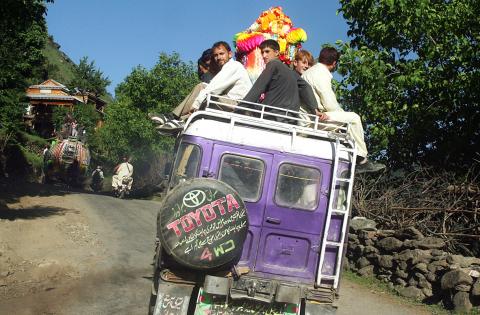
Photo: AFP
“This area is very peaceful and there is no fear of terrorism,” said Waqar.
India and Pakistan have fought two wars over Kashmir, a Muslim-majority region claimed in full by both sides.
Sporadic clashes killed six soldiers in January and February, but officials on both sides have kept tensions in check and Pakistan’s newly elected prime minister, Nawaz Sharif, has put improving relations with India at the cornerstone of his foreign policy.
By contrast, Taliban attacks in the northwest — where mountain resorts have in the past sucked domestic tourism away from Kashmir — and the impact of crippling power cuts pushing people towards balmier climes is also driving visitor numbers higher, Waqar said.
There are now 115 registered guesthouses in the Neelum valley, local deputy commissioner Mohammad Farid told AFP, compared to none in 2010.
The authorities say they have stepped up security after the climbers were killed in Gilgit-Baltistan, but because tourists in Kashmir are Pakistani rather than foreign, they are not braced for a serious knock-on effect.
“We have strict instructions that all government and private guest houses are to close their main gates at 10pm,” Kashmir tourism minister Abdul Salam Butt told AFP.
“No doubt this incident has damaged international tourism in Pakistan, but it won’t affect Kashmir because we host domestic tourists,” he added.
Raja Zarat Khan, who owns a private guesthouse, said he was fully booked into the next week and he had no cancellations.
“I’m having a great season,” he said.
Mohammad Awais, 44, runs a restaurant, a string of guesthouses and now also takes tour groups to the Neelum Valley.
“This business has changed my life. Last year I did excellent trade because I gave tourists a lot of incentives: hiking, trekking, fishing, boating. The environment in Neelum Valley is very good. Once you enter the valley, no one wants to leave.”
He also doesn’t expect the Gilgit shootings to have a major impact.
“It hasn’t made a big difference — perhaps four to five percent because the elite class, who come here, feel insecure, but no one has cancelled any bookings. People are still coming,” he said.
The boom is welcome in a region where many men have traditionally left behind their families to work in Pakistan’s largest cities.
Awais has hired cleaners, cooks, drivers and tourist guides: all men who would otherwise be unemployed.
Suppliers have benefited. Villagers even sell their freshly grown cherries, apricots and plums to tourists.
But others warn that more needs to be done to sustain the boom across the rest of Pakistani-Kashmir.
“There are some beautiful places in our area, but there are no proper roads available and the tourists can’t go to these areas,” said Khawaja Abdul Samad, who is thinking about opening his own hotel.

April 28 to May 4 During the Japanese colonial era, a city’s “first” high school typically served Japanese students, while Taiwanese attended the “second” high school. Only in Taichung was this reversed. That’s because when Taichung First High School opened its doors on May 1, 1915 to serve Taiwanese students who were previously barred from secondary education, it was the only high school in town. Former principal Hideo Azukisawa threatened to quit when the government in 1922 attempted to transfer the “first” designation to a new local high school for Japanese students, leading to this unusual situation. Prior to the Taichung First

Chinese Nationalist Party (KMT) Chairman Eric Chu (朱立倫) hatched a bold plan to charge forward and seize the initiative when he held a protest in front of the Taipei City Prosecutors’ Office. Though risky, because illegal, its success would help tackle at least six problems facing both himself and the KMT. What he did not see coming was Taipei Mayor Chiang Wan-an (將萬安) tripping him up out of the gate. In spite of Chu being the most consequential and successful KMT chairman since the early 2010s — arguably saving the party from financial ruin and restoring its electoral viability —

The Ministry of Education last month proposed a nationwide ban on mobile devices in schools, aiming to curb concerns over student phone addiction. Under the revised regulation, which will take effect in August, teachers and schools will be required to collect mobile devices — including phones, laptops and wearables devices — for safekeeping during school hours, unless they are being used for educational purposes. For Chang Fong-ching (張鳳琴), the ban will have a positive impact. “It’s a good move,” says the professor in the department of
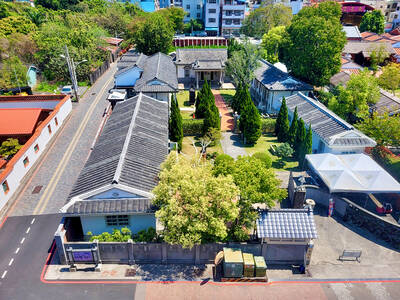
Toward the outside edge of Taichung City, in Wufeng District (霧峰去), sits a sprawling collection of single-story buildings with tiled roofs belonging to the Wufeng Lin (霧峰林家) family, who rose to prominence through success in military, commercial, and artistic endeavors in the 19th century. Most of these buildings have brick walls and tiled roofs in the traditional reddish-brown color, but in the middle is one incongruous property with bright white walls and a black tiled roof: Yipu Garden (頤圃). Purists may scoff at the Japanese-style exterior and its radical departure from the Fujianese architectural style of the surrounding buildings. However, the property